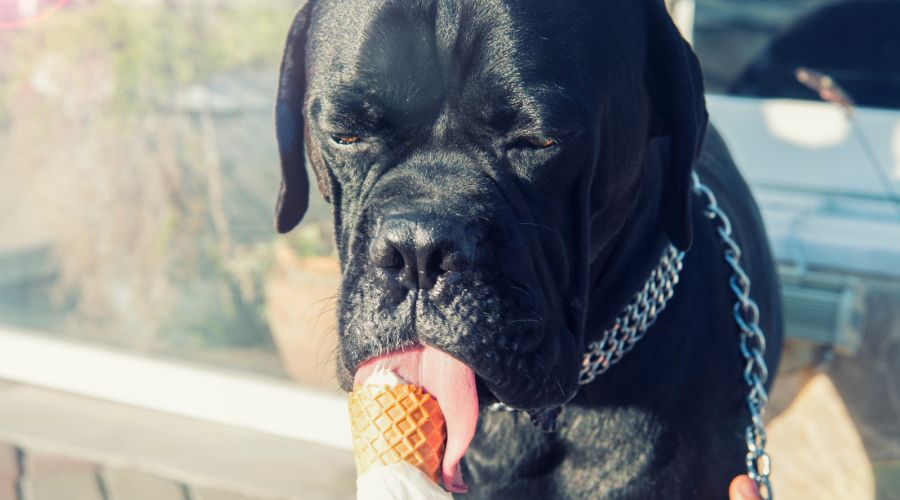As pet owners, we want nothing but the best for our furry friends. We love to spoil them with treats and give them our leftovers, but sometimes we forget that not all human food is safe for our dogs.
One of the most common treats that dogs enjoy is ice cream. But the question is, can pregnant dogs eat ice cream? or is it safe to give dogs ice cream?
Let’s find out can dogs eat ice cream?

Table of Contents
Why Do People Give Ice Cream to Dogs?
Dog owners give their dogs ice cream for several reasons. Some use it as a treat to reward good behavior, while others simply want to share a sweet moment with their pup. But before feeding your dog ice cream, it’s important to understand the benefits and risks.
What are the benefits of feeding your dog ice cream?
Ice cream is high in calcium, which is vital for a dog’s bone health. It also provides an excellent source of energy, especially during warmer months when dogs tend to be more active.
Are there any risks associated with feeding your dog ice cream?
Yes, there are some risks associated with feeding your dog ice cream, particularly if they are lactose intolerant or have a sensitive stomach. Consumption of dairy products can cause diarrhea and vomiting in some dogs.
Are there any alternatives to ice cream for dogs?
There are plenty of dog-friendly frozen treats available on the market, such as frozen yogurt and dog ice cream. Some pet owners even make their own homemade dog ice cream using ingredients that are safe for dogs.
Can Pregnant Dogs Eat Ice Cream?
When it comes to pregnant dogs, giving them ice cream can be risky. Pregnant dogs have different nutritional needs compared to non-pregnant dogs, and feeding them ice cream can result in complications during labor and delivery.
What are the risks of giving ice cream to a pregnant dog?
Eating too much ice cream can lead to excessive weight gain in pregnant dogs, which can increase the risk of complications during labor and delivery.
Consuming large amounts of dairy products like ice cream can also lead to diarrhea and vomiting, potentially harming both the mother and her puppies.
Can a pregnant dog eat vanilla ice cream?
It’s best to avoid feeding pregnant dogs any type of ice cream, including vanilla ice cream. High sugar content in ice cream can cause blood sugar inconsistencies in pregnant dogs, which can lead to complications in whelping.
Some sources suggest giving pregnant dogs vanilla ice cream while they are in labor to provide them with energy and calcium .
Angie Meroshnekoff recommends keeping a tub of vanilla ice cream handy to feed to the dog when she is halfway through giving birth to give her an energy boost.
However, it’s important to note that while plain vanilla ice cream is generally low in fat and sugar, it can contain ingredients that are unsafe for dogs, such as xylitol and dairy.
Therefore, it’s best to consult with a veterinarian before giving any food to a pregnant dog, including vanilla ice cream.
What should I feed a pregnant dog?
It’s important to feed pregnant dogs a balanced diet that is specially formulated for them. Puppy food is a great option as it contains essential nutrients and minerals that the mother and her puppies need during pregnancy and lactation.
Is Ice Cream Safe for Dogs?
Ice cream contains dairy, which can be difficult for dogs to digest. Some ice cream brands also contain xylitol and other sweeteners that can be toxic to dogs.
Can feeding your dog ice cream be toxic?
Yes, ice cream with certain sweeteners like xylitol can be toxic to dogs. Xylitol is commonly used as a sugar substitute in many human foods, including ice cream.
But even in small amounts, it can cause a rapid release of insulin, leading to hypoglycemia (low blood sugar) in dogs.
What happens if a dog eats too much ice cream?
Eating too much ice cream can cause dogs to experience digestive issues such as diarrhea, vomiting, and bloating. This can result in discomfort and dehydration, which can be dangerous for dogs, especially if they are pregnant.
What are some signs of lactose intolerance in dogs?
Like humans, some dogs are lactose intolerant, meaning they lack the enzymes needed to digest lactose properly.
Signs of lactose intolerance in dogs include diarrhea, vomiting, and excessive panting.
What Should You Do If Your Dog Eats Ice Cream?
If your dog eats ice cream and shows signs of discomfort, it’s important to contact your veterinarian right away.
Depending on the brand and ingredients in the ice cream, your vet may recommend monitoring your dog at home or bringing them in for an exam.
When should you call the vet?
You should call your vet if your dog shows any signs of discomfort after eating ice cream. These signs include vomiting, diarrhea, excessive panting, and lethargy.
What are some common symptoms of xylitol poisoning in dogs?
Symptoms of xylitol poisoning in dogs include vomiting, loss of coordination, seizures, and liver failure.
What should you do if your dog eats ice cream with xylitol?
If you suspect your dog has eaten ice cream with xylitol, take them to the veterinarian immediately.
Treatment for xylitol poisoning may include inducing vomiting, administering activated charcoal, and providing supportive care.
Can You Make Homemade Dog Ice Cream?
Yes, you can make homemade dog ice cream using ingredients that are safe for your dog to consume.
What ingredients should you use to make dog-friendly ice cream?
Some dog-friendly ingredients for homemade ice cream include plain yogurt, peanut butter, and pumpkin puree.
These ingredients are high in protein and nutrients and are safe for dogs to consume in moderation.
Are there any flavors that dogs should avoid?
While some dog-friendly flavors include peanut butter and pumpkin, it’s important to avoid giving dogs flavors that contain chocolate or caffeine, as these can be toxic to dogs.
Can you give your dog frozen yogurt instead of ice cream?
Yes, frozen yogurt is a great alternative for dogs who enjoy icy treats. Be sure to check the label and confirm that it does not contain any harmful ingredients such as xylitol.
In conclusion, while pregnant dogs should avoid consuming ice cream, non-pregnant dogs can indulge in moderation.
It’s important to keep in mind the risks associated with feeding your dog ice cream and consider alternative frozen treats that are safe for your furry friend.





